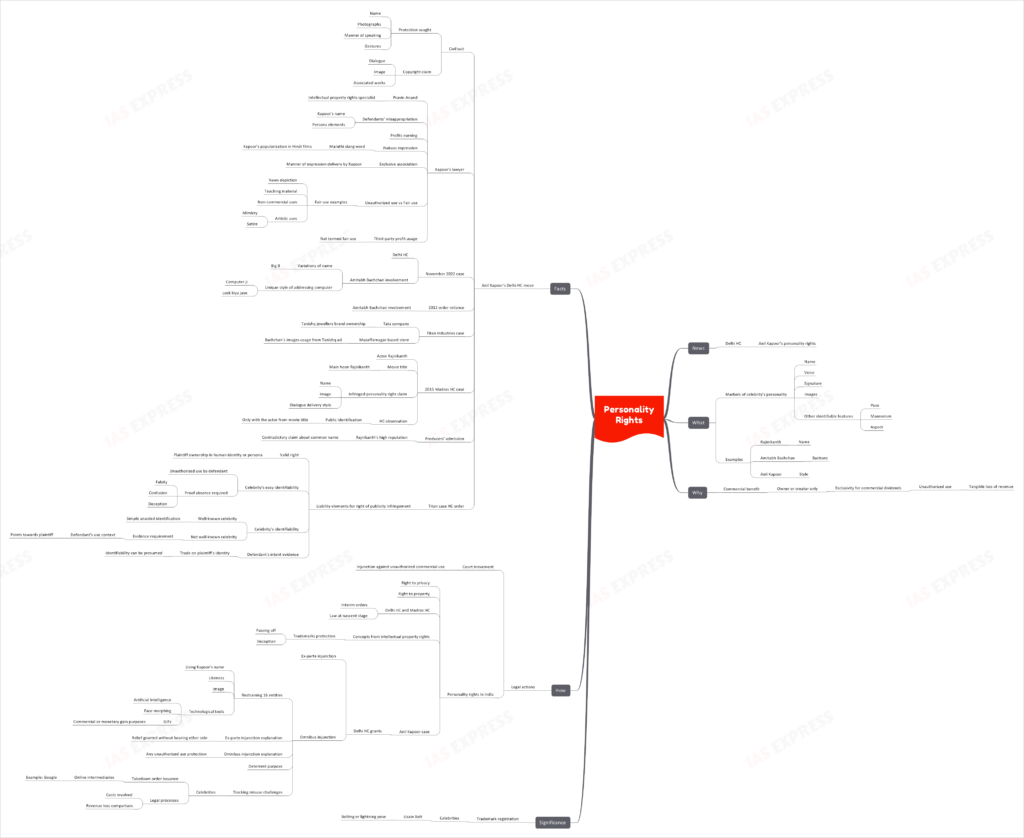Personality Rights

In a recent legal development, the Delhi High Court has taken up the case of Anil Kapoor’s personality rights. This case highlights the importance of safeguarding a celebrity’s distinctive identity in the context of commercial benefit and unauthorized use.
What Are Personality Rights?
Personality rights encompass various markers of a celebrity’s identity, including their name, voice, signature, images, and other identifiable features such as pose, mannerisms, or distinctive aspects of their persona. These rights aim to protect a celebrity’s unique identity from unauthorized commercial exploitation.
Why Protect Personality Rights?
The protection of personality rights is crucial for two main reasons:
Commercial Benefit
Ownership or creation of one’s personality rights provides exclusivity for commercial dividends. Unauthorized use of these rights can result in tangible losses of revenue, making it imperative to safeguard them.
Significance of Trademark Registration
Some celebrities, like Usain Bolt, have gone a step further by trademarking specific aspects of their identity, such as Bolt’s iconic lightning pose. This not only offers legal protection but also helps in preventing unauthorized use.
How to Protect Personality Rights
The protection of personality rights involves legal actions and concepts from intellectual property rights:
Legal Actions
- Court Movements: Celebrities can seek injunctions against unauthorized commercial use of their personality rights.
Personality Rights in India
In India, personality rights are associated with the right to privacy and the right to property. Both the Delhi High Court and the Madras High Court have issued interim orders recognizing the importance of these rights. However, the legal framework for personality rights in India is still at a nascent stage.
Concepts from Intellectual Property Rights
- Trademarks Protection: Celebrities can use trademark laws to protect their identity. Concepts like passing off, deception, and unfair competition come into play to prevent misuse.
Anil Kapoor’s Case
Anil Kapoor’s case in the Delhi High Court involves several key elements:
- Civil Suit: Kapoor has filed a civil suit seeking protection for various aspects of his personality, including his name, photographs, manner of speaking, and gestures.
- Copyright Claim: Kapoor’s legal team, led by Pravin Anand, an intellectual property rights specialist, has also brought forth a copyright claim concerning his dialogues, images, and associated works.
- Jhakaas Expression: Kapoor’s iconic “Jhakaas” expression, a Marathi slang word popularized in Hindi films, is central to the case.
- Exclusive Association: Kapoor aims to establish exclusive association between his manner of expression delivery and himself, preventing unauthorized use.
- Unauthorized Use vs. Fair Use: Kapoor’s legal team distinguishes between unauthorized use and fair use, providing examples of the latter, such as news depiction, teaching material, non-commercial uses, and artistic uses like mimicry and satire.
- Third-Party Profit Usage: Kapoor’s legal team argues that third-party profit usage does not fall under fair use.
Precedents and Reliance
Kapoor’s case draws on several legal precedents:
- In November 2022, the Delhi High Court was involved in a similar case with Amitabh Bachchan, addressing variations of his name and his unique style of addressing a computer.
- The case relies on a 2012 order concerning Amitabh Bachchan and a Titan Industries case related to Tanishq jewelry’s use of Bachchan’s images.
- A 2015 Madras High Court case involving Rajinikanth’s personality rights and the movie title “Main Hoon Rajnikanth” also serves as a reference.
Liability Elements for Right of Publicity Infringement
In determining liability for the infringement of the right of publicity, several elements come into play:
- Valid Right: The plaintiff must establish ownership of their human identity or persona.
- Celebrity’s Easy Identifiability: Unauthorized use by the defendant must be proven, and evidence of falsity, confusion, or deception may not be required.
- Celebrity’s Identifiability: For less well-known celebrities, evidence may be required to establish identifiability based on the context of the defendant’s use.
- Defendant’s Intent Evidence: Evidence of the defendant’s intent to trade on the plaintiff’s identity can be crucial in establishing liability.
If you like this post, please share your feedback in the comments section below so that we will upload more posts like this.

